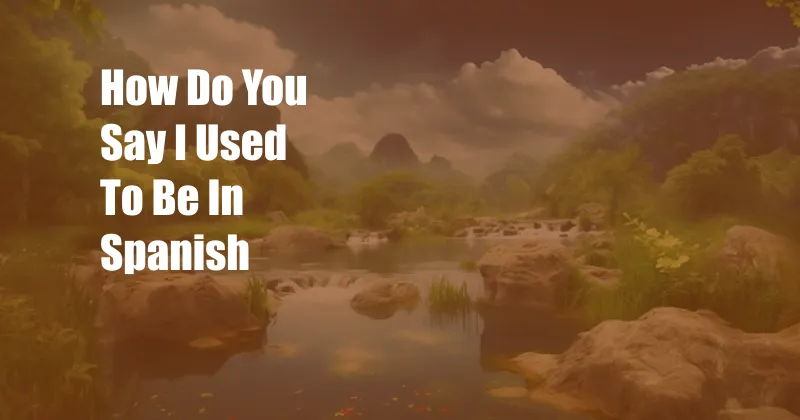
How Do You Say I Used to Be in Spanish?
Have you ever found yourself pondering how to express the concept of “I used to be” in the intricate tapestry of the Spanish language? If so, you’ve embarked on a linguistic journey that is both captivating and rewarding. Join me as we delve into the nuances of Spanish grammar and unravel the secrets of this intriguing phrase.
Before we embark on this grammatical escapade, let us first establish a solid foundation by understanding the concept of “I used to be.” This phrase signifies a state or condition that existed in the past but has since ceased to be. It’s a way of expressing that something was once true but is no longer the case.
The Magic of “Solía”
In the realm of Spanish grammar, the magic wand that transforms “I used to be” into a melodious phrase is the verb solía. This enchanting verb, when used in the imperfect tense, assumes the power to convey the idea of a past habitual action or state.
To harness the full potential of solía, we must conjugate it according to the subject pronoun. The following table provides a comprehensive guide:
| Subject Pronoun | Conjugation of solía |
|---|---|
| Yo | Solía |
| Tú | Solías |
| Él/Ella/Usted | Solía |
| Nosotros/Nosotras | Solíamos |
| Vosotros/Vosotras | Solíais |
| Ellos/Ellas/Ustedes | Solían |
Weaving Words into Meaning
Now that we possess the grammatical wand of solía, let’s weave words into meaningful phrases. To express “I used to be,” we simply conjugate solía according to the subject pronoun and follow it with the infinitive form of the verb describing the past state.
For instance, if you wish to say “I used to be a teacher,” you would say: Yo solía ser maestro.
The flexibility of this construction allows us to express a wide range of past states. Here are a few examples:
- Solía vivir en Madrid. (I used to live in Madrid.)
- Él solía jugar al fútbol. (He used to play soccer.)
- Nosotros solíamos ir a la playa todos los veranos. (We used to go to the beach every summer.)
Tips and Expert Advice
As you embark on your Spanish-speaking adventures, keep these tips and expert advice in mind:
- Pay close attention to the subject pronoun and ensure that you conjugate solía accordingly.
- Remember that solía is used to express past habitual actions or states, not temporary or isolated events.
- Practice using solía in different contexts to gain fluency and confidence.
- Immerse yourself in Spanish-speaking environments, such as movies, music, and conversations, to enhance your comprehension.
Frequently Asked Questions
To further illuminate your understanding, let’s explore some frequently asked questions:
- Can I use “used to” with other verbs besides “be”?
Yes, “used to” can be used with any verb to express a past habitual action or state. - How do I say “I am used to” in Spanish?
To say “I am used to,” you would use the phrase estoy acostumbrado a followed by the infinitive form of the verb. - What is the difference between “solía” and “era”?
Solía is used to express past habitual actions or states, while era is used to express a permanent state or condition in the past.
Conclusion
Congratulations! You have now mastered the art of expressing “I used to be” in Spanish. Armed with this knowledge, you can confidently navigate conversations and delve into the rich tapestry of the Spanish language. Remember to practice regularly, immerse yourself in Spanish-speaking environments, and embrace the beauty of linguistic exploration.
May your Spanish-speaking adventures be filled with joy and fulfillment. Are you eager to embark on further linguistic journeys? If so, explore our website for a treasure trove of articles that will ignite your passion for languages.